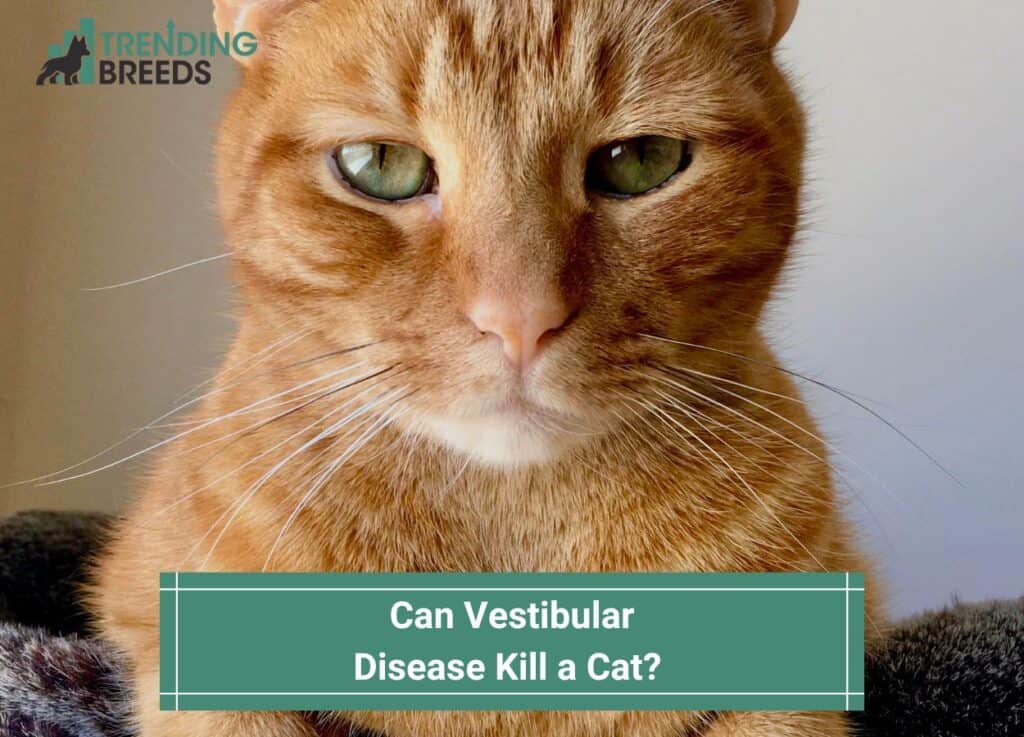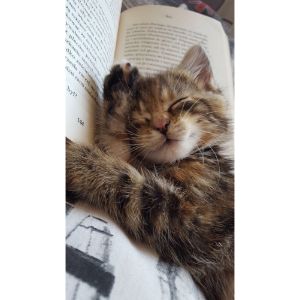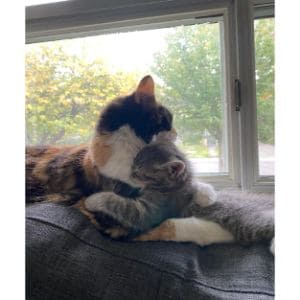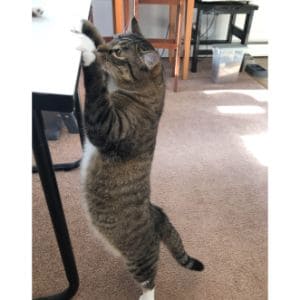
Can vestibular disease kill a cat? Fortunately, in most cases, vestibular disease isn’t serious enough to kill a cat. It can be a debilitating disease that could interfere with your cat’s life and even lead to other health problems.
The more you know about the disease, the more prepared you will be to deal with it and seek the proper help.
Before you scroll further down this guide, check out these other cat-related articles: What Over The Counter (OTC) Medicine For A Cat’s Upset Stomach? and How To Drain A Cyst On Your Cat.
Table of Contents
What Is Vestibular Disease?

Vestibular disease is an illness that causes problems inside your cat’s ears. It is also referred to as vestibular syndrome.
At one moment, your cat might look perfectly normal; the next, they may have trouble standing and balancing. One of the most obvious symptoms is a loss of balance.
Your cat’s vestibular system is the cause of the condition. Specifically, this system contains two large centers in your cat’s body – one at the brain’s base and one in the inner ear.
Cats use this system to stay balanced while moving about.
Cats’ heads are tracked by nerves and fluid-filled canals in the brain’s cortex. This device can detect your cat’s head and determine in which direction it is moving.
For the brain to receive this information, the inner ear must transmit it. These head movements are then translated into changes in your cat’s muscles and eyes by the brain.
If your cat’s vestibular system becomes disrupted, it may lose balance due to vestibular disease. Male and female cats can get it regardless of age, but older cats are more likely to get it.
Dizziness and vertigo are signs that the vestibular system is malfunctioning. As well as humans, other mammals, including cats, have vestibular systems that control balance and coordination in the brain and inner ear.
Cats’ worldviews and axis are altered when this system is disrupted.
The ability to distinguish up from down becomes more challenging. Consequently, cats suffering from vestibular disease may experience head tilts, falls, and difficulty walking.
Unsettling feelings of loss of balance can lead to nausea and vomiting. Siamese and Burmese cats are more prone to vestibular disease, which typically occurs very suddenly.
The condition most commonly affects older cats but can affect cats of any age.
What Are The Symptoms?

Most vestibular diseases are idiopathic. However, several factors may contribute to their development. If you notice any of these symptoms, it could mean your cat has this disease.
These symptoms can also be a sign of another illness or disease, so it’s best just to let a veterinarian examine your cat and make a correct diagnosis.
Ear Infection
Ear infections are a common disease symptom, especially inner ear infections. Infection of a cat’s ear could damage part of its vestibular system.
The sooner you visit the vet if your cat develops an ear infection, the better the chances of preventing complications.
Tumors

Vestibular disease isn’t common in cats, but it’s important to consider, especially in older cats.
It is possible for growth to negatively impact the vestibular system if it can impact the inner ear. Polyps perform similar functions.
Head Injury
Vestibular disease can develop in cats as a result of head trauma. You can permanently damage your cat’s vestibular structure if you cause blunt force trauma to its brain or ear.
Vestibular diseases are especially likely to develop following brainstem trauma.
Ototoxic Medication

Ototoxic drugs have a toxic effect on the sensory nerves that control balance and hearing.
Your veterinarian will know to avoid administering certain proven ototoxic medicines (which they won’t give you) while others are inconclusive.
Medications should never be given to your cat without first consulting a veterinarian.
How is Vestibular Disease in Cats Diagnosed?

A veterinarian will examine your cat physically to determine if he or she suffers from vestibular disease.
An ear examination will be performed to see whether your cat has any signs of infection, inflammation, or tumors.
An evaluation of the brain’s vestibular system will also be performed to determine whether that is causing the symptoms.
It is sometimes possible to diagnose a disease using advanced imaging techniques. It may be done with MRIs or computed tomography scans.
While you may be able to observe the symptoms of your cat’s problem, you won’t be able to make a proper diagnosis and should always consult a veterinarian.
How Is It Treated?

The treatment depends on the severity of the condition, the underlying cause, and the symptoms present. If you have any questions about the treatment plan for your cat, you can contact your vet.
Treating vestibular disease without knowing its cause is usually possible by treating its symptoms rather than treating the condition itself.
Vomiting or refusal to eat cats may require anti-nausea medication and nutritional therapy. Idiopathic vestibular disease in cats usually resolves within a few weeks.
It is typical to use antibiotics and antifungals to treat bacterial and fungal infections. When chronic ear infections persist, surgery may be necessary. In some cases, laser surgery will be able to treat tumors.
A malignant tumor in an older or middle-aged cat can be treated with radiation and chemotherapy.
Vestibular idiopathic diseases usually have excellent prognoses and recovery rates. A cat usually recovers fully within three weeks.
The disease itself and its symptoms generally don’t recur. Treatment success and severity of the associated condition affect the prognosis of vestibular disease associated with a more serious condition.
Following your veterinarian’s post-operative and post-treatment instructions is very important.
Throughout the entire duration of treatment, always administer prescribed medications exactly as directed, especially antibiotics. Infections could recur aggressively in the absence of this action.
You may need to make adjustments upon returning home to ensure your cat is not injured.
As the vestibular system can malfunction and cause serious injuries, you may want to limit the outdoor activities of your cat during the recovery period. The recovery period may also require you to help your cat eat and drink.
Keep your cat from irritating the surgery site if it has had surgery. Provide a warm, safe resting place for as long as it takes to recover.
It is generally unnecessary to schedule follow-up appointments for patients with vestibular disease due to idiopathic causes. Your vet may schedule follow-up appointments as needed if your vestibular disease has a more serious underlying cause.
Do not hesitate to contact your veterinarian if the disease recurs or doesn’t improve after treatment.
Can Vestibular Disease Kill a Cat?

The vestibular disease mainly affects the balance and coordination of a cat.
Typically, it is not life-threatening to cats, though it is distressing to them. In this condition, a cat’s balance and coordination may be affected, and it may be wobbly when it stands or walks.
Despite its non-fatal nature, the disorder, if left untreated, can result in significant discomfort and further complications.
Nausea, vomiting, and head tilting are also common symptoms of Vestibular Disease in cats, but usually, they resolve on their own within a few days.
You should take your cat to the vet for supportive care, such as supplemental nutrition and fluids, until their condition improves if they have been diagnosed with vestibular disease.
The condition may need to be surgically corrected in rare cases when other treatments have failed to resolve the underlying cause.
Generally, though, if the condition is managed properly from the beginning and some gentle nursing is provided by your veterinarian, most cats recover completely within a few weeks.
Some cases of vestibular disease, however, may have underlying causes of more severe conditions, such as tumors or infections, which are fatal if left untreated.
You should seek veterinary care as soon as possible if your cat shows any symptoms of vestibular diseases, such as sudden loss of balance and head tilting.
Treatment and early diagnosis are important for alleviating symptoms and preventing complications.
How Long Does Vestibular Disease Last?

Idiopathic vestibular disease is a short-term condition that self-resolves. A cat usually experiences the worst symptoms within 24-48 hours, then steadily improves.
There is no need to wait months for it to end to seek treatment. Some symptoms can last longer than others and may linger after more serious symptoms are gone.
How Do Cats Get Vestibular Disease?

It is thought that cats with Siamese or Burmese fur are more likely to suffer from ear infections, which are thought to be the most prevalent form of vestibular disease.
Idiopathic vestibular diseases are usually characterized by the lack of identification of their causes.
The problem is that many cats with vestibular syndrome are deaf as well.
Certain drugs may lead to similar symptoms in cats when exposed to them. In some breeds, the vestibular syndrome is congenital but possible in any cat.
It is not contagious, so there is no need to worry about your cat getting it from another cat or being able to pass it on to you.
Can Cats Recover From Vestibular Disease?

Depending on the severity of the symptoms, the prognosis for vestibular disease in cats can range significantly.
Vestibular disease in cats usually resolves on its own after several months, although a complete recovery may take longer than that.
In most cases, vestibular disease can be treated effectively if the underlying cause is identified and treated promptly.
An inner ear infection, for instance, treated with feline antibiotics, generally has a favorable outcome. It is less likely to be successful if the cause of the vestibular disease is not discovered or cannot be treated.
A tumor or other serious condition that causes the vestibular disease can have varying prognoses depending on the degree of damage and the effectiveness of treatment.
Veterinary professionals are more qualified to provide a more accurate prognosis.
How To Help Your Cat Deal With Vestibular Disease

It is possible to help your cat recover during the recovery process if he or she suffers from vestibular disease.
Creating a safe and stable environment for cats with vestibular disease is important to help them stand or walk.
A soft bed or blanket for the cat may be provided along with tripping hazards that have been removed.
Dizziness and vertigo can make it difficult for cats to eat and drink when they suffer from vestibular disease.
To help your cat get the nutrition he or she needs, you may have to hand feed them or provide small, frequent meals. Your cat can also drink water easier if you offer it in a shallow dish or use a water fountain.
Your cat may need physical support if he or she has difficulty standing or walking. Helping the cat balance while they walk might entail holding their back end.
In addition, you may have to carry your cat up to and down from its crate or help it get in bed.
It may take several weeks or months for your cat to recover from vestibular disease fully. Taking your cat’s treatment plan seriously and being patient will help him recover fully.
The symptoms of the disease should not be used as an excuse to punish your cat or scold it if it topples over or bumps into anything.
Always talk with a veterinarian to find out if there are medications that you can give your cat to help lessen its symptoms and help it feel better.
Your vet will also be able to tell you how severe the disease is and have suggestions for treating it. Be sure to take your cat for checkups so the vet can monitor your cat and keep track of its progress.
Frequently Asked Questions
What is the difference between vestibular disease and stroke in cats?
A stroke causes permanent damage to a cat’s brain, but vestibular disease does not.
Can ear cleaning cause vestibular disease in cats?
If your cat has an ear infection, cleaning the ear might cause a flare-up.
Does vestibular disease in cats cause seizures?
No, this does not cause seizures.
If you find this guide, “Can Vestibular Disease Kill a Cat,” informative and helpful, you can check out these other cat-related articles from our team:
- What Is a Cow-Hocked Cat?
- Why Is My Cat Scared Of Something I Can’t See?
- How Do I Know If My Cat Is Cold?
You can learn more about vestibular disease by watching “What is Vestibular Disease?” down below:




